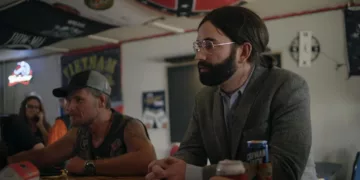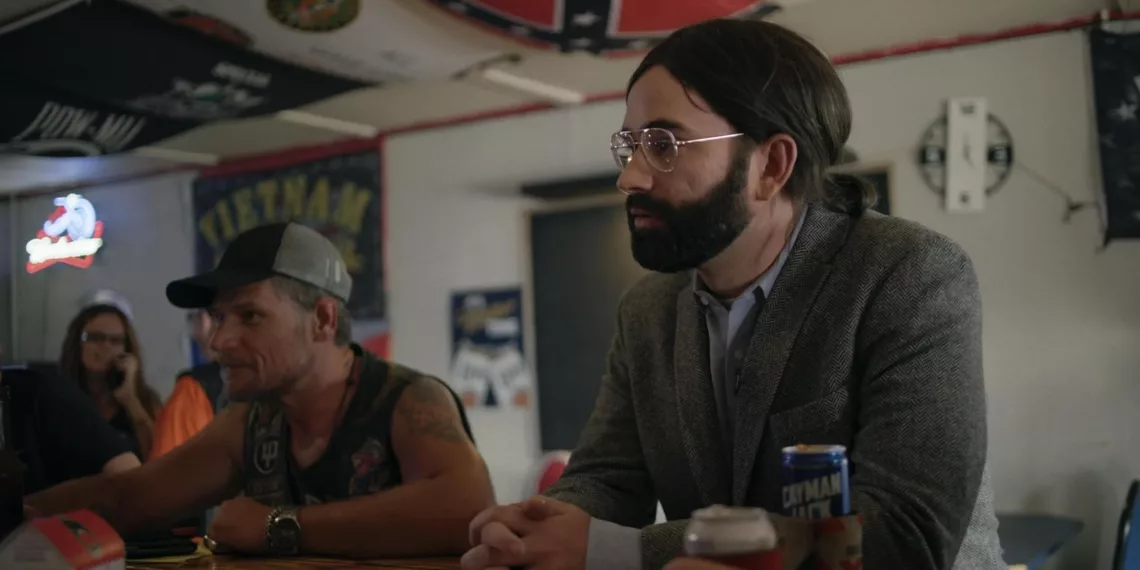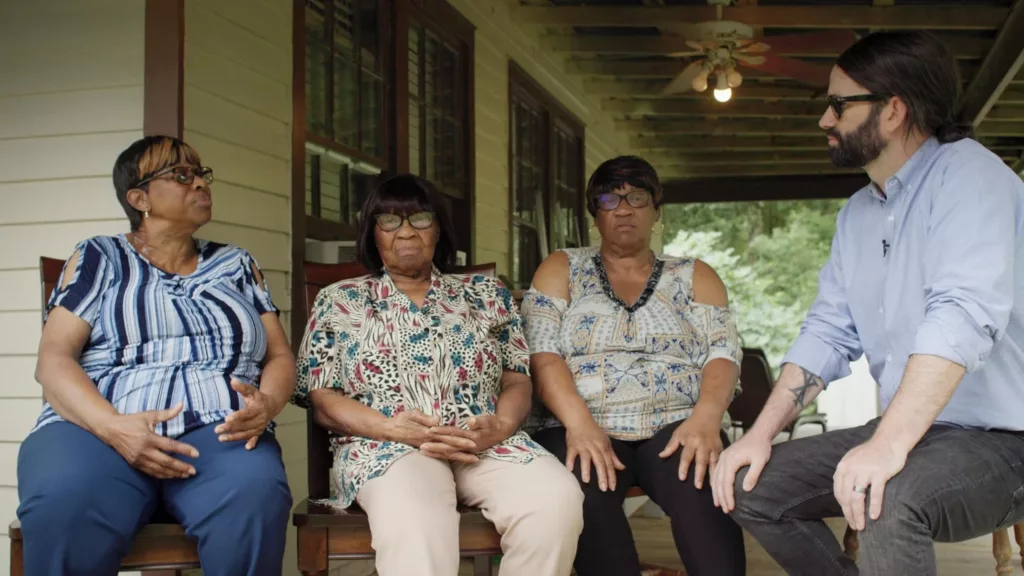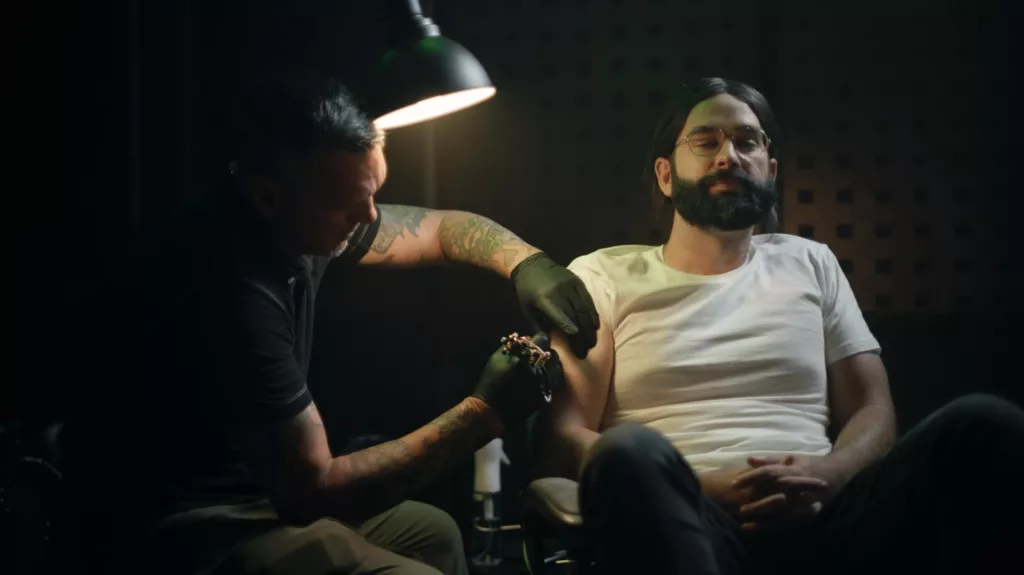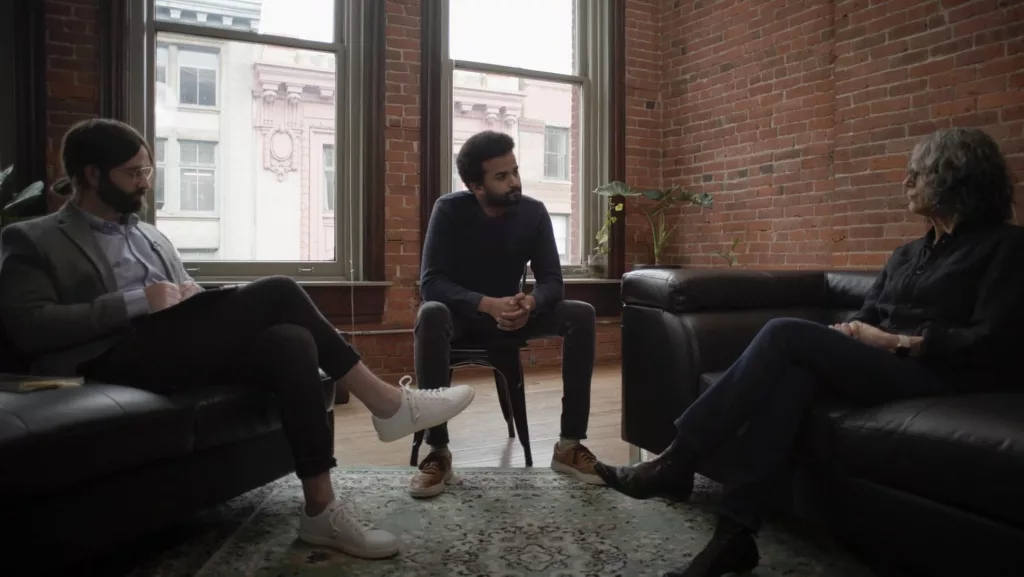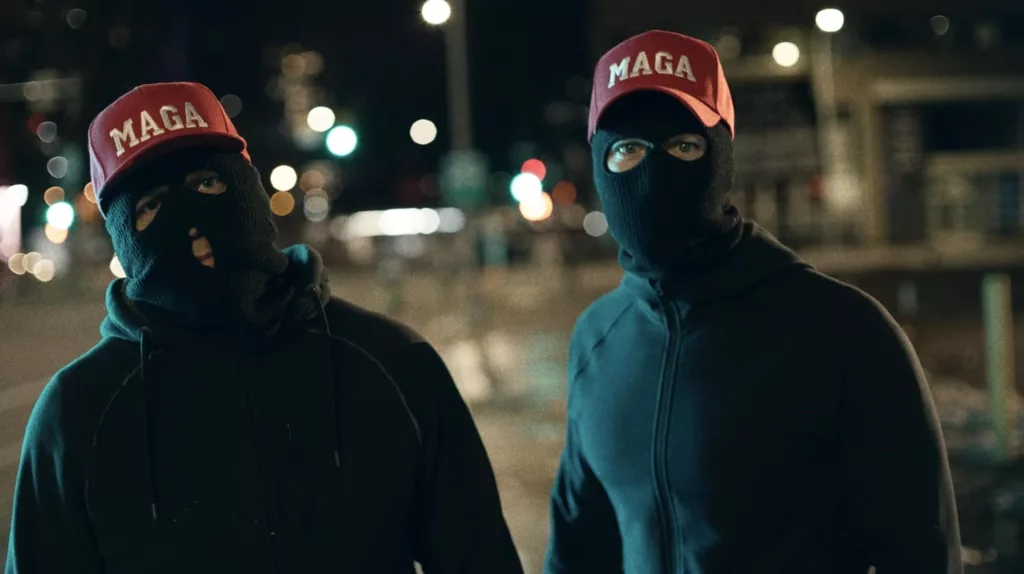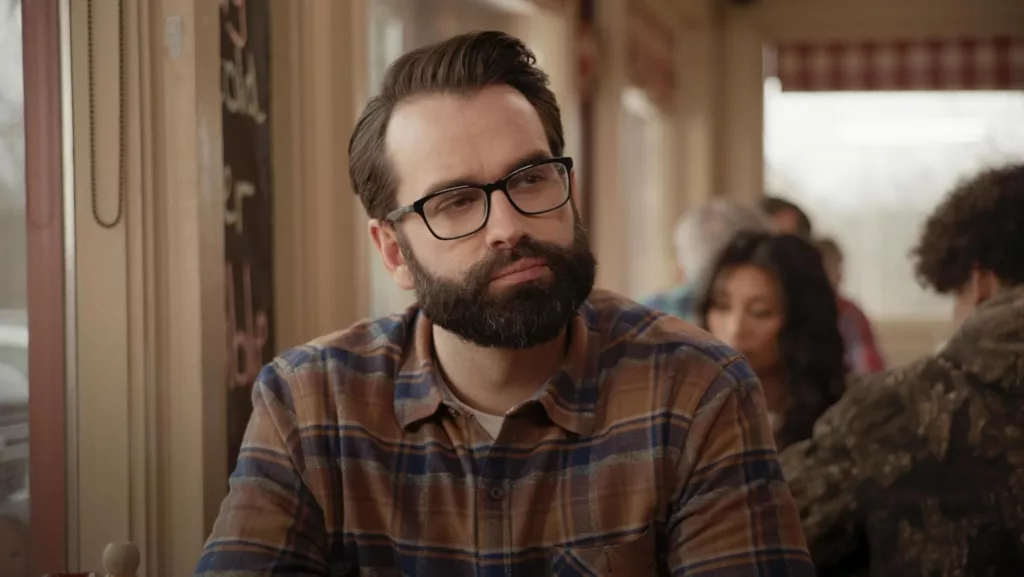Matt Walsh isn’t one to shy away from a contentious issue. In his previous film “What is a Woman?”, the Daily Wire columnist sought to understand the concept of gender identity. Now, in “Am I Racist?”, Walsh tackles another timely topic – diversity, equity and inclusion training in America.
Like his character Borat, Walsh goes undercover for this documentary. Only instead of foreign journalist, he assumes the guise of a white man earnest to learn. His goal is to explore whether he himself holds racist views. But Walsh also wants to pull back the curtain on DEI experts and uncover their true messages.
To do so, Walsh receives online certification in diversity training. From there, he infiltrates seminars and workshops, conducting surprising interviews along the way. One of his biggest “gets” is Robin DiAngelo, the bestselling author on antiracism. Walsh even hosts his own DEI event, all while keeping his true identity hidden.
Through it all, Walsh adopts a gonzo, infiltration style reminiscent of Sacha Baron Cohen. His undercover antics hope to shine a light on controversial topics in an entertaining yet revealing way. By film’s end, we’ll find out not just whether Walsh is biased, but how DEI ideology plays out when no one is watching. With keen observation and subtle humor, “Am I Racist?” sets out to uncover deeper truths about the diversity industry in America today.
Undercover Lessons
Getting certified in diversity training wasn’t too difficult for Walsh. A few online courses were all it took to earn his “DEI Expert” credential. And some of the lessons he learned along the way raised his eyebrows, to say the least.
One module encouraged teachers to avoid calling on white students first in class, which Walsh found rather ironic. As he delved deeper, more problematic guidelines emerged. There was even a suggestion that white children be kept separate during social activities so kids of color could thrive without “white fragility” interfering.
From there, Walsh set out to explore the reading list. At the bookstore, one text stood out – “White Fragility” by Robin DiAngelo. Flipping through, he chuckled at the author’s claim that people of color bear no responsibility for racism because they lack institutional power. This viewpoint would come back in a big way later on.
Walsh’s first live workshop didn’t make him any less skeptical. At the seminar, the speaker proclaimed that Americans remain paralyzed by the nation’s past sins. The only solution was tearing down history itself, as the Founders were irredeemable. Their revolutionary ideas meant nothing without viewing events through a racial lens.
Most uncomfortable of all was when Walsh’s true identity was exposed at the meeting. Suddenly safety was at risk with this interloper in their midst. It seemed honest discussion took a back seat to performative wokeness.
Through these initial undercover exploits, Walsh began uncovering an agenda that went far beyond diversity. His next moves would reveal even more surprising tactics from those cashing in on America’s struggle with racial issues.
Getting to Know the “Experts”
Walsh’s most revealing talks came during his interviews with prominent DEI advocates. Chief among them was Robin DiAngelo, the bestselling author behind “White Fragility.” Their discussion proved quite illuminating, and downright jaw-dropping at its conclusion.
DiAngelo largely brushed off Walsh’s doubts about concepts like white privilege and framing all interactions through a racial lens. But she was left stumped when pressed to consider non-white ethnic groups who’ve faced their own hardships assimilating in America. Her simplistic view that racism equals only those with the most “power” started to crack.
Another eye-opening exchange came courtesy of Race to Dinner hosts Regina Jackson and Saira Rao. Their exclusive soirees came with a steep $2,500 price tag. Over wine and food, Jackson and Rao expounded on their belief that America and its founding were inherently evil. They even called the nation itself “not worth saving.”
Walsh also got to sit down with DEI consultant Kate Slater. Though her conversation proved less volatile, Slater did inadvertently highlight contradictions in Diversity Inc.’s messaging. She encouraged cultural acceptance in one breath, then condemned it as appropriation in the next.
Time and again, Walsh’s interviews revealed how DEI had become less about bringing people together, and more about conflict, cashing in on blame, and painting the world in reducible black-and-white. They were certainly meals to remember, just not in the way the hosts had intended.
Getting the Inside Look
Walsh’s undercover skills were put to the test infiltrating real DEI sessions. The first was a company-mandated workshop – always a treat. There, an instructor warned the staff that disagreeing meant “shutting down Black voices.” They were further told empathy for opposing views was a sign of “fragility.”
But his most brazen operation came at a Race to Dinner soiree. How could Walsh resist crashing Saira Rao and Regina Jackson’s lavish $2,500 dinner party? In a stroke of comedic genius, he talked his way into serving the elite guests.
What followed was an illuminating look behind the curtain. Freely drinking wine, Rao and Jackson’s veneer slipped away. They decried America as a “piece of shit” nation unworthy of their efforts. One attendee echoed these sentiments, dismissing the Founders’ revolutionary ideals as “a scam.”
When Walsh couldn’t resist licking a plate clean, all bets were off. A furious Jackson gave chase as the unmasked infiltrator fled into the night. But Walsh’s clandestine recordings provided no laughter – only a sobering view of the radicalism preached when comfortable audiences embraced each poisonous word.
Through it all, one thought lingered – what kind of “diversity” seminars prescribe intolerance, or counsel replacing history with uncompromising condemnation of the past? As Walsh’s adventures demonstrated, DEI’s dictionary definition differs greatly from what proponents preach when unrestrained.
Exposing DEI’s Dollars and Cents
One thing was clear from Matt Walsh’s DEI expeditions – it had become big business. And he had the financial figures to show for it.
Through certified “experts” like DiAngelo, Walsh experienced their services firsthand. A single meeting with Robin cost thousands, with some charging tens of thousands for their time. It revealed how DEI had profitized off perpetuating America’s supposed inherent and irredeemable racism.
Walsh argued this money machine risked making race relations worse. By convincing people biases could never be overcome, it bred only more division and resentment. These experts claimed the moral high ground, while lining their pockets by preaching a message of permanent accusation.
Even the seminars and workshops had dollar signs in their eyes. Companies paid exorbitant rates for instructions that seemed designed to damage workplace unity, not improve it. As the demand for DEI skyrocketed, credentials meant less than the ability to cash in.
Perhaps most alarming was how this ideology shifted focus from bringing people together to endlessly scrutinizing supposed implicit biases. When the accent became accusing others rather than understanding different views, it only promoted further polarization in Walsh’s view.
Through it all, one question lingered – had DEI become an industry of dividing Americans for profit, not remedy? If reconciliation was the true goal, new paths forward surely had to be found.
Laughing into the Light
Walsh knew his pranks stirred reaction, but saw humor as the best tool for unmasking DEI’s contradictions. And boy, does Am I Racist? deliver some doozies.
Who could forget Robin DiAngelo’s shocked face as Walsh proposes his on-the-spot “reparations”? The dinner debacle involving a plate-licking Walsh and a furious host? Dialogue from “experts” that seems ripped from a satire?
Some may feel Walsh’s antics go too far. Sure, crashing elite events or pushing guests to extremes lacks tact. But is total politeness the way to expose problematic notions spread behind closed doors?
If anything, the comedy extracts DEI’s most absurd elements in a way dry rhetoric cannot. It gets discussions heard that serious documentaries may brush over. And it compels subjects like DiAngelo to truly defend ascribed roles, not just recite platitudes.
Maybe the laughter opens minds that lectures leave closed. Even skeptics watching with intent to sourly criticize find views expanded. The important issues DEI raises still merit every American’s consideration, despite industry flaws.
In the end, that’s what Matt Walsh wants – for people of all persuasions to critically engage with how best to reconcile America’s unfinished business of equal dignity for all. Maybe a well-placed prank, by disarming discomfort, moves that ball forward better than a scowl ever could.
Setting the Stage for Change
Undoubtedly, Am I Racist? unearthed profound insights about today’s DEI establishment. Walsh pulled back the curtain on an industry seemingly more focused on condemnation than construction.
While the film proved entertaining, its deeper aim was scrutinizing a social justice apparatus that may unintentionally worsen divisions. Indeed, Walsh stirred reaction, but if that spurred candid thought, purpose was served.
As for Walsh’s initial query – does viewing make one any closer to judgment? Perhaps the question itself misses the point. For beyond absolving personal prejudice, the film challenged preconceptions and highlighted flaws demanding remedy.
Going forward, thoughtful discourse must replace accusation. And reformers would do well embracing America’s democratic spirit – one that values open debateresolve differences. With understanding overpowering otherization, redemption may finally become reality.
Though views will vary on its merits, Am I Racist? ignited a debate too critical to ignore. In kickstarting conversation on building equitable society, its legacy will depend on followers walking its discussed path toward a more just future.
The Review
Am I Racist?
Am I Racist? is an engrossingly thought-provoking documentary that uses humor to shine an unflinching light on important issues. While some may find its tactics objectionable, Walsh starts a much-needed discussion by pulling back the curtain on a lucrative yet controversial social movement. Those open to re-examining their views will find much to ponder in this film's daring expose of the real messages being spread behind closed doors.
PROS
- Engaging gonzo style that keeps viewers entertained
- Sheds light on controversial aspects of DEI rarely scrutinized
- Subtly hilarious scenes that effectively reveal hypocrisy
- Hosts important yet often divisive debates through new lens
- Brings greater transparency to lucrative diversity industry
CONS
- Polarizing tactics may turn some viewers off entirely
- Focuses more on DEI flaws than constructive solutions
- Lacks deeper historical context for American racial issues
- Protagonist Walsh even more divisive than illuminating
- Scenes meant to provoke may give some the wrong takeaway
